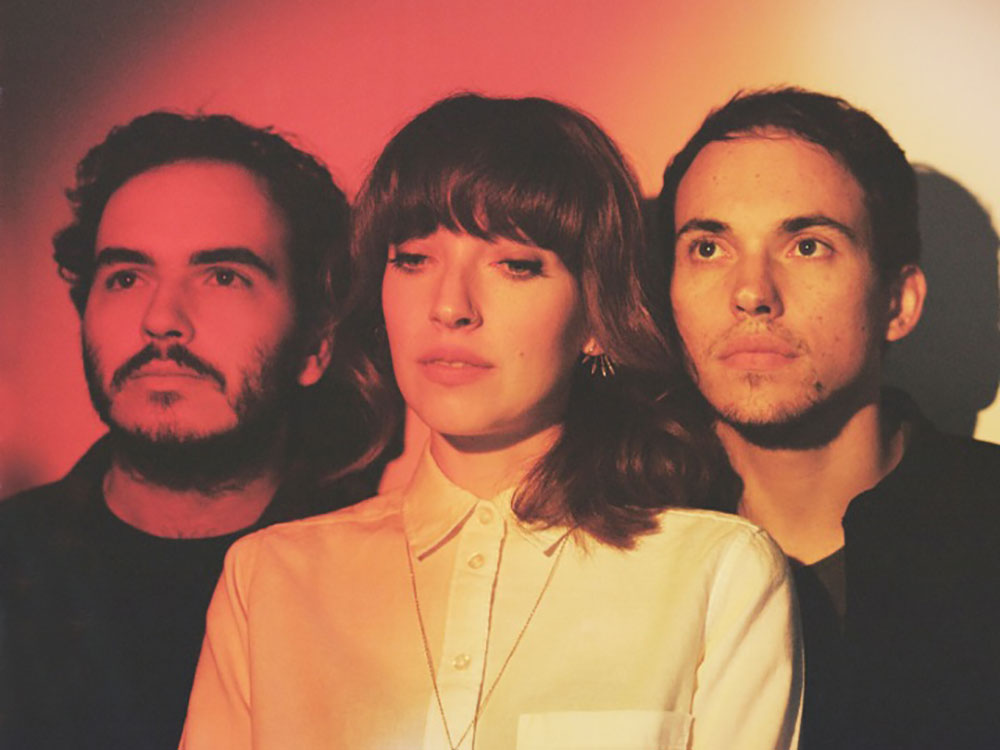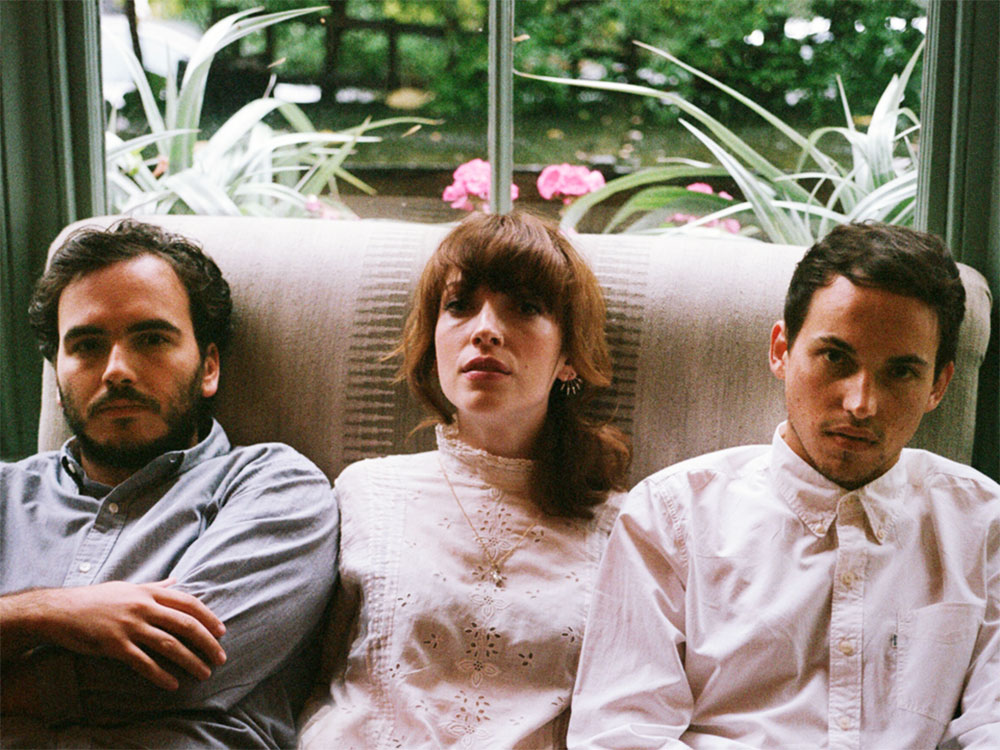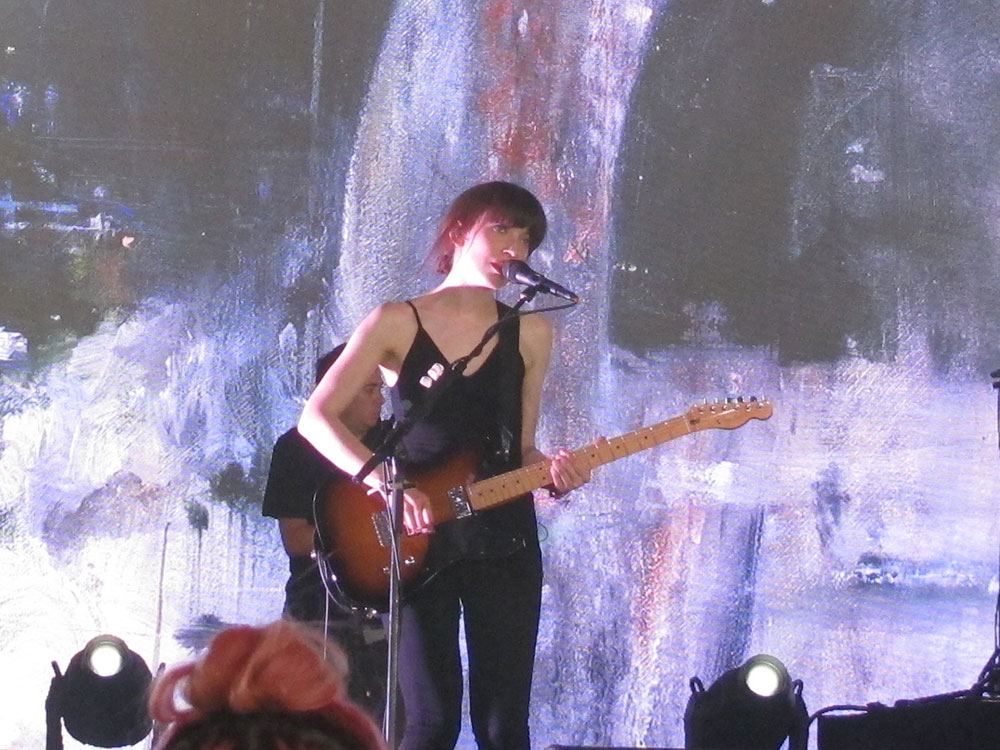
On stage at Panorama Music Festival, the European band, Daughter made a surprising move when they segued from new track, “No Care,” an aggressive and quick tempoed recollection of empty sexual experiences, to “Youth,” the emotional hit single that put them in the ears and hearts of the indie music world. Although unexpected, the transition made sense, their latest album, “Not To Disappear,” features a surprisingly wide range of emotions – from heartbreak to anger to sympathy and back again. Since forming in 2010, British singer, Elena Tonra, Swiss guitarist Igor Haefeli, and French drummer, Remi Aguilella have released two albums and toured the world, getting a bit older and gaining a vast amount of life experiences along the way. “Not To Disappear” showcases this new maturity with a rawer sound and lyrics that are much more personal than previous releases but somehow still have the ability to resonate with the experiences of listeners everywhere.
Right before their magnetic Panorama set, The Untitled Magazine chatted with Elena, Igor, and Remi about the making of “Not To Disappear.” See the full interview below and make sure to catch the band on their North American tour which kicks off November 1st at Terminal Five in NYC.
Untitled Magazine: Growing up in different countries, did you all have musical upbringings? What were your early influences?
Igor Haefeli: I didn’t really have a musical family per say. They always loved to listen to records, but I kind of made my own path. I started listening to punk rock and that got me into playing guitar. As my tastes evolved I started listening to Radiohead and more electronic music and getting interested in how to create different sounds with a guitar. Then ultimately I became interested in recording.
Elena Tonra: My parents were similar, I didn’t really have a musical family, but they loved it so I listened to their record collections when I was a kid. It was a lot of 70’s music – Neil Young, Bowie, and Joni Mitchell – that was my musical upbringing. My grandfather is Irish and used to sing Irish traditional folk songs, I think that started my interest in songwriting. I was following the songwriters rather than the instrumental stuff and then I developed that passion later.
Remi Aguilella: I did a lot of jazz drumming when I was younger and classical percussion. I was in a bunch of bands and orchestras and then moved to London and got more into folk music. That’s where I met these two wonderful people.
UM: How did you end up forming Daughter?
ET: We all went to the same music school. It’s called ICMP in Kilburn, North London. Igor and I were in the same course, it was a one-year song writing diploma. It was the first year they started it and they didn’t really know what they were doing but it was fun. We got to meet other musicians and writers and that was really cool. Then Remi was doing the drum degree at the same place so we kind of all got to know each other through this assignment we had to do that involved us working with Remi for a project at school. After we all left school, that was when we really formed the band. We were kind of admiring each other from afar while being in there.

UM: You released your current album Not to Disappear in January. How did the process differ from your first album, If You Leave? I know you had a bunch of touring under your belt by the time of the second album and everyone was obviously a little older too. Did you feel like you had more life experience? You also recorded in New York.
IH: Well we had the experience of already doing the first record. A friend of ours said, “You need to do a record to know how to make a record.” So we had a better idea on how we wanted to do it. We rented out a little space in this sweets factory that had a lot of little studios and we spent over a year, writing, recording demos, working on different sounds, textures and figuring out where we wanted to go. By a certain point at the end of the year, we were like, “Okay we can start looking at a place to start to record this properly and do this the right way.” We started looking at different studios and also people to work with and we got in touch with Nicolas Vernhes who has a studio called Rare Book Room in Green Point. We got along really well and felt like he was the best person to work with for this record, so we came over for three months and we re-recorded the whole thing. We had a good sense of what we wanted to do for each song. We were informed as well a lot by the touring we had done, that was a big thing for us.
ET: I think we developed our sound during those two years after the first record came out. It’s nice to have a starting point, which is different from where we were with the first one. It’s strange though because the first album is a collection over such a long period of time. When I was approaching writing the second album, it was kind of like you’ve only really sort of lived that three-year gap between the two albums. Luckily, a lot of shit happened in three years! It’s strange to go into the second album because you’ve been collecting ideas for your whole life time for the first one and then suddenly you’re like, “Shit what do I do now?” It was quite interesting to go into the next sort of thing, trying to talk about what it’s like being 26..
UM: How was it for you, Remi?
RA: Well it was different for me from the first album because we had a studio so I was able to record a lot of ideas on the drums that I wasn’t really able to do for the first album. The first album I had programmed a lot of things before adding it to the studio. So I had a generally good idea of what I wanted to achieve but then it was only when I started playing it in the studio that I basically made up the final part. So there was a lot more preparation going into this one, which made more confidence in the playing. I was just happy to be doing it in New York with Nicolas. There was an icecream shop just next door and it was really sunny. It was funny to do it in the summer as well. When you’re done recording you can just go outside, take a break and kind of have a good time, then get back into it with a clear head. Like, “This is it, I’m going to record something new here.”
UM: Yes, that’s so necessary especially in a city like New York – you need those moments where you can breathe and experience what’s outside. Going back to the differences with the latest album I think a lot of listeners noticed that the lyrics seem more personally specific. For instance on “Doing the Right Thing” you talk about a really hard subject, Dementia, which a lot of families tackle and it doesn’t just affect the afflicted but everyone around them. You also talk about sex quite a bit. Were you conscious that you were going into more personal depths or did it just pour out of you?
ET: I think it really just poured out. I try not to overthink or over-edit when I write. I think a lot of things probably could’ve been taken out. Like, “That’s slightly too much information guys!” Everything I’ve written has always been very personal. So for EPs there was more stuff like hiding behind people being trees and my mother being a river. The first album started to become a little bit more of a narrative, a straight from my head thing. This album feels a lot more conversational and a lot more of directing how I feel. I just couldn’t write in that other way. I feel like there’s almost a strange innocence to the way you first start writing. If I tried to replicate it, I think it would be insincere. My thoughts aren’t coming out in that strange way anymore. I just don’t think about it in that way. With this album I was talking a lot more about the real things, the kind of harsh realities and the harsh facts. The unglamorous side of sex, which I don’t think many people talk about. I think it’s a good thing to talk about sex and all areas of life. Growing up in a Roman Catholic childhood, it’s not something that you do talk about. So it’s taken me a while to feel confident in that subject, like I can talk about it and I can embrace it and not be like “Ah, my vagina what’s that!?” It’s taken a few years.
UM: The song that really stands out for me on the album is, “No Care” because it sounds so different in tempo and structure. Sex is often described as this beautiful, loving moment and in that song it is quite the opposite. Can you talk more about that song and how the sound came together?
ET: I think it definitely sounds very full of venom, which is strange because it’s not necessarily as violent as the song suggested it is. Sex is wonderful and can be really beautiful but it can also be terribly lonely. That’s the thing I really wanted to come across with that song, I felt like somebody’s bad memory of someone else. That’s a really lonely feeling, when you’re not connecting and yet you’re still here. There’s no covering that, that’s just the way it is. I think loneliness and sex never really gets sung about a lot. I think it’s something that everyone feels at some point whether you’re with someone you just met or you’re with someone you’re totally in love with. Your feelings can change in a relationship and often it is through those moments that you see how your relationship is going. Tempo-wise and song-wise it was one that came out very rapidly in a stream of consciousness. I didn’t really write it down I just took a mic and sang it all and recorded it. The guitar part and the drums are this sort of throwing it out thing, which was very fun. We need to do more of that.
IH: Musically it has something very tongue-in-cheek about it which helps contrast from the very bleak, descriptive lyrics. Which are amazing, I still think they are some of Elena’s best yet, but it kind of needed that slightly more erratic, drum machine, Casio, feel as well.
UM: Do you have any songs that stick out to you on the album?
ET: “Doing the Right Thing,” is one that I really like and feel very strongly about because it’s about my grandmother. I’ve always seemed to write songs about myself and it’s very self-indulgent and selfish but writing a song through the eyes of my grandmother was something I really liked. I loved how that song turned out musically and everything about it. It still makes me very sad to play it. That means something – when you still feel emotionally for something you wrote two years ago.
IH: I have a particular soft spot for “Mothers,” because it’s a song that took some time to get to where it is, in terms of arrangement and feel. It took about a year to get it to where it was and I was happy we went through the painful process.
ET: It was like a labor! We actually had to give birth to that song.
RA: For me, “Made of Stone” just because it was one of the songs that felt the most untouched. You’re almost listening to a demo – the first intention of an emotion. That’s what I like about it.

UM: You have a bunch of festivals coming up and you have a few more solo shows in the US. Then you have a pretty extensive European tour. Given that you’re going to Europe and you’re all from different countries, do you have any opinions or thoughts on the current political situation going on right now with Brexit and the migrant crisis?
IH: Brexit is a huge problem for many reasons. Philosophically speaking, I think we should really stick together. I don’t think borders should be as pronounced as they are. It feels like regressing and it was all done on a rhetoric of fear, so it’s disappointing. It’s even more disappointing that now no one is taking full responsibility for it.
ET: It feels like we’re weak and we can’t really control anything at the moment and it’s all out of our hands. We’re all just hoping we don’t have any racist idiots in our Parliament. It’s strange because we were all very confident that we would remain in the EU. With the area that we’re in and the friends that we have – we just felt very confident about it. Since that happened, there’s been a lot of hate crimes spurred on by Brexit and there’s been a lot of horrible things that have happened. I’m quite scared about it but I do feel there is a feeling of togetherness from the people.
IH: With our band, we wouldn’t have met if it weren’t for the European Union and the affordable education throughout Europe and also the free movement of people.
ET: Everyone needs to be kinder to each other. Making people feel like they don’t belong somewhere is sick and horrible. What’s so beautiful about traveling the world and meeting people is that there are so many wonderful people.
RA: It’s a similar problem that you guys are facing in the United States right now. There are a lot of things based on fear and lies, as opposed to telling the truth. It’s a lot easier to lie repeatedly. It’s like an entertainment industry of politics at the moment. You want to be seen as different and then suddenly you have idiots who end up being in power and it’s based on lies again. I’m kind of heartbroken about the whole situation.
Interview by Jasmine Williams for The Untitled Magazine


